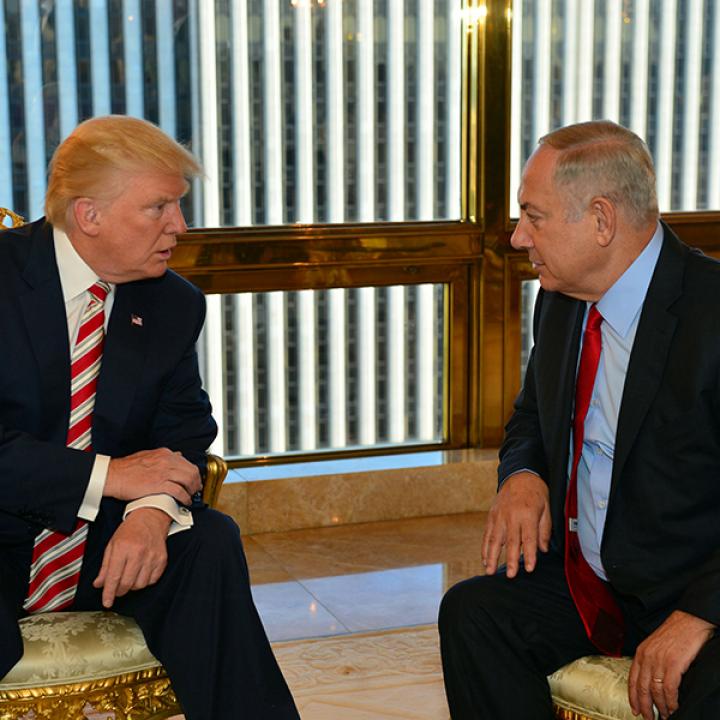
- Policy Analysis
- Articles & Op-Eds
Forget the Ultimate Deal: Trump and Netanyahu Should Save Gaza For Now

A plan to avert further economic deterioration in the strip may not be an ultimate deal, but it is a necessary one.
When Prime Minister Binyamin Netanyahu visits President Donald Trump at the White House on Monday, they might commiserate over the domestic investigations each are facing as well as take great satisfaction over Trump's affirmation of the opening of a U.S. embassy in Jerusalem on the 70th anniversary of Israel's existence this spring. Trump could still trumpet what he famously called the "ultimate deal"—his idea for an end to the conflict between Israelis and Palestinians. But this not attainable now. It probably never was.
This does not mean that an unpredictable Trump would not try anyway, but he should not. The gaps between Netanyahu and Palestinian Authority President Mahmoud Abbas were too wide even before the December announcement on moving the U.S. embassy to Jerusalem.
Instead, the Trump-Netanyahu summit should focus on what is needed now. A successful summit on Monday would mean the U.S. and Israel would pledge to join others in the international community to halt the economic deterioration in Gaza. Halting the economic decline is the best hope to avert a fourth war between Gaza and Israel within this past decade. Ironically, such an American focus could play to the Trump Administration's desire to focus on the economic rather than political dimensions of an issue.
Of course, the leaders have important issues to discuss including averting an Israeli-Iranian escalation in Syria, as evidenced by recent developments when an Iranian drone flying over Israel led to the rare downing of an Israeli F-16 and Israel knocking out Syrian anti-aircraft batteries. However, the Palestinian issue should not get lost.
The "ultimate deal" would likely have failed. Even in 2013 to 2014, when each leader could afford to be more accommodating, the Venn Diagram between Netanyahu and Abbas did not sufficiently overlap to reach agreement on the five core issues—borders, security arrangements, Jerusalem, refugees and mutual recognition.
Now, with Netanyahu's coalition narrower than before and those surrounding Abbas more focused on succession, the two leaders have moved even farther apart. My recent visit to Israel and Ramallah highlighted that both Israel and the Palestinians have long expected Trump's offer to be far less generous than that offered under President Barack Obama, and therefore both sides predicted the Palestinians would automatically reject it.
Yet, the chasm between the U.S. and Palestinian Authority should not discourage both parties from taking advantage of the opportunity to converge and work together on a more immediate problem, namely averting further economic deterioration in Gaza. The number of trucks entering Gaza has dropped from 1000 to 350 per day due to a lack of purchasing power, according to Israeli military officials. According to the UN and Israel, Gaza's water is not expected to be drinkable by 2020. Last July, the beaches of Ashkelon had to be closed for a few days due to a health hazard from neighboring Gaza.
Donor countries held an emergency meeting in Brussels a few weeks ago, pledging to assist Gaza, but there is no evidence that the donors are willing to contribute the money needed for heavy infrastructure such as power stations and desalination plants. A major economic effort in Gaza is required and the Quartet—the U.S., European Union, Russia and the secretary-general of the UN—should come together on this issue.
The issue of Gaza is not as taboo as it previously was in Israel, when Israelis viewed Gaza's plight as another excuse for blaming Israel. Now right-wing minister Yisrael Katz has been urging the cabinet to discuss plans to build a port and airport in Gaza, perhaps by extending the very densely populated area by dint of an artificial island. The Knesset has even convened a caucus to draw attention to Gaza. All understand that chaos in Gaza does not serve Israel or the Palestinians.
The timing of Israeli-Palestinian cooperation over Gaza is interesting as it comes at a time that Hamas leader Yihye Sinwar has acknowledged to Gazans that Hamas has failed at governance. Such an admission by Hamas marks a momentous shift, even if Hamas will not yet concede to make the critical move of yielding their weaponry to the PA. Similar to Hezbollah, Hamas would like to retain the authority even if they yield the responsibility. However, as part of true economic stabilization in Gaza, the PA must be able to return to Gaza with genuine control at least over governance. Failure to stabilize Gaza would reinforce the Hamas narrative that the world is indifferent to their fate and only Hamas can defend Palestinian rights.
Some critics may say that Gaza should be squeezed until Hamas yields completely and surrenders its weapons. However, during my visit, I did not sense that a single senior Israeli security official believed this was possible—at least not now. If it took 11 years to get to this point of deterioration since Hamas assumed power in Gaza, could it take another 11 years to promote economic development? What will happen in the meantime?
Lately, Abbas, 83 this month, seems more focused on squeezing Gaza as a means to pressure Hamas than searching for remedies to the humanitarian situation on the ground or worrying about the trajectory of Gaza's future. Another set of critics may charge that any focus on Gaza is a diversion from the "ultimate deal" as the issues of Gaza and the West Bank should be solved together.
However, the ultimate deal is not possible now: in the Middle East, whenever it is all or nothing, it is always nothing. While a plan to avert further economic deterioration in Gaza is not an ultimate deal, it is a necessary one.
David Makovsky is the Ziegler Distinguished Fellow at The Washington Institute and author of its interactive map website Settlements and Solutions.



